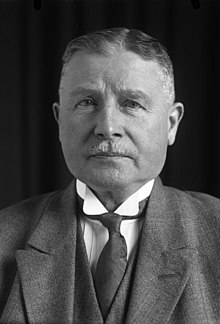
Back فيلهلم جرونر ARZ Вільгельм Гронер Byelorussian Wilhelm Groener Czech Wilhelm Groener German Wilhelm Groener Spanish ویلهلم گرونر Persian Wilhelm Groener Finnish Wilhelm Groener French וילהלם גרנר HE Wilhelm Groener Hungarian
Wilhelm Groener | |
|---|---|
 Groener in 1928 | |
| Reich Minister of Defence Weimar Republic | |
| In office 20 January 1928 – 13 May 1932 | |
| Chancellor | Wilhelm Marx Hermann Müller Heinrich Brüning |
| Preceded by | Otto Gessler |
| Succeeded by | Kurt von Schleicher |
| Reich Minister of the Interior Weimar Republic | |
| In office 9 October 1931 – 1 June 1932 | |
| Chancellor | Heinrich Brüning |
| Preceded by | Joseph Wirth |
| Succeeded by | Wilhelm von Gayl |
| Reich Minister of Transport | |
| In office 25 June 1920 – 12 August 1923 | |
| Chancellor | Constantin Fehrenbach Joseph Wirth Wilhelm Cuno |
| Preceded by | Gustav Bauer |
| Succeeded by | Rudolf Oeser |
| Chief of the German General Staff German Empire | |
| In office 3 July 1919 – 7 July 1919 | |
| Preceded by | Paul von Hindenburg |
| Succeeded by | Hans von Seeckt |
| Personal details | |
| Born | Karl Eduard Wilhelm Groener 22 November 1867 Ludwigsburg, Neckar District, Württemberg |
| Died | 3 May 1939 (aged 71) Potsdam-Bornstedt, Brandenburg, Nazi Germany |
| Nationality | German |
| Political party | Independent |
| Military service | |
| Allegiance | |
| Branch/service | |
| Years of service | 1884–1919 |
| Rank | Generalleutnant |
| Battles/wars | World War I |
Karl Eduard Wilhelm Groener (German pronunciation: [ˈvɪlhɛlm ˈɡʁøːnɐ] ⓘ; 22 November 1867 – 3 May 1939) was a German general and politician. His organisational and logistical abilities resulted in a successful military career before and during World War I.
After a confrontation with Erich Ludendorff the Quartermaster general (Erster Generalquartiermeister) of the German Army, Groener was reassigned to a field command. When Ludendorff was dismissed in October 1918, Groener succeeded him. Groener worked with the new Social Democratic president Friedrich Ebert to foil a left-wing take-over during the German Revolution of 1918–19. Under his command, the army bloodily suppressed popular uprisings throughout Germany.
Groener tried to integrate the military, which was dominated by an aristocratic and monarchistic officer corps, into the new republic. After resigning from the army in the summer of 1919, Groener served in several governments of the Weimar Republic as minister of transportation, interior and defence. He was pushed out of the government in 1932 by Kurt von Schleicher, who was working on a pact with the Nazis.